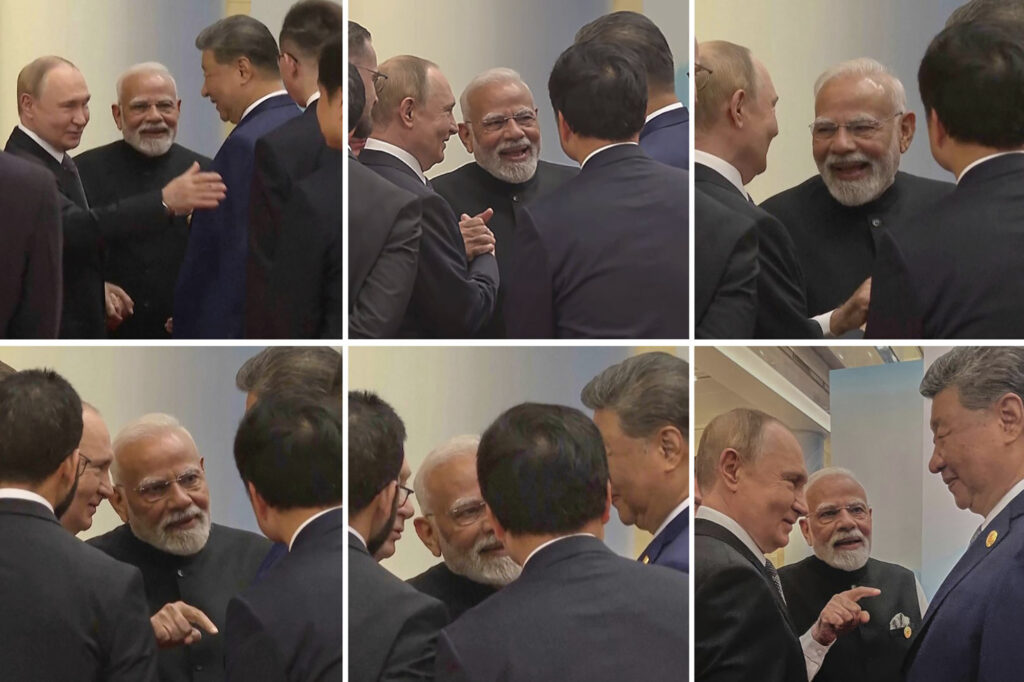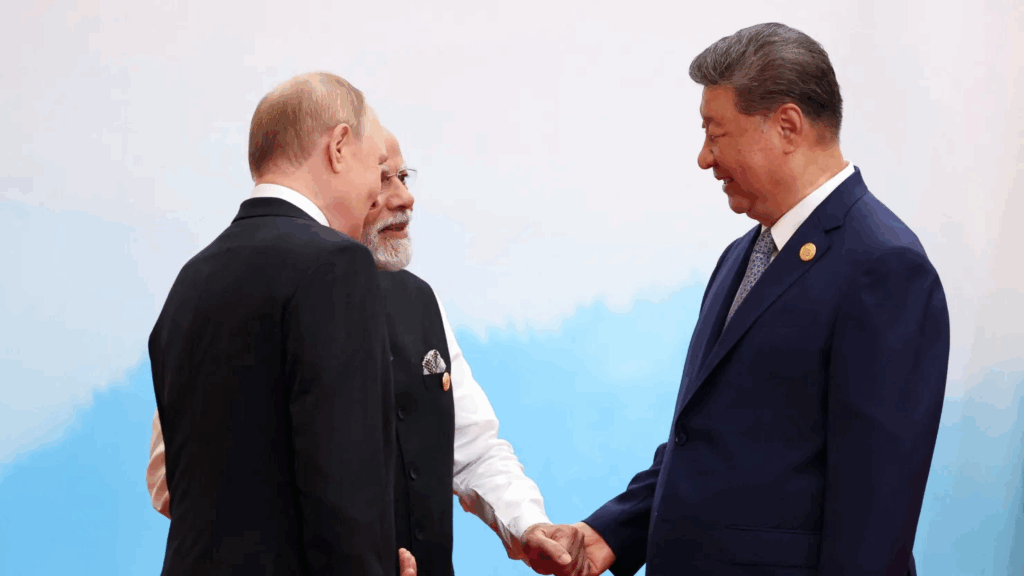Review of Afghanistan developments
The Shanghai Cooperation Organization summit (SCO) held in Tianjin, China, was among the most significant and unparalleled in recent times, featuring leaders from over 20 member and observer nations in attendance. This marked the inaugural occasion where leaders opposing US unilateralism convened in China. A crucial yet unspoken objective of the summit was to enhance economic and security collaboration while showcasing a robust and unified representation of the SCO members in response to Western influence.
Features of the SCO Summit 2025
The SCO Summit and the Chinese military parade, when considering the composition of the attendees, the declarations made, and the discussions conducted, included significant elements that can be examined and understood in the context of global events.
The “Global Governance” Initiative and the Multipolar Order
During the SCO Summit, Chinese President Xi Jinping introduced the concept and importance of “global governance.” This initiative for global governance was articulated by the Chinese President as a novel strategy aimed at redefining the global order and enhancing Beijing’s influence in international decision-making. Indeed, through the introduction of this initiative, China conveyed a distinct message to the United States, indicating that the world would no longer be dominated by a single country and that developing countries would genuinely have a voice in the global order.
The global governance strategy further suggests that China is enhancing its influence in international decision-making, advocating for multilateralism, and working towards a balance of power on the world stage. Xi Jinping’s statements revealed that China is resolute in its aim to create a new order in opposition to Western dominance and is prepared to assume the central role in this emerging framework.
Alliance of China, Russia and India
The attendance of the Russian President and the Indian Prime Minister at the SCO Summit held considerable importance for various reasons. While both China and Russia are participants in the SCO Summit, the presence of Vladimir Putin and Narendra Modi in Beijing at this moment conveys a distinct message to the United States. Throughout the visit, the Russian President underscored the significance of international multilateralism, endorsed the concept of ‘global governance,’ and referred to the relationship between Beijing and Moscow as strategic, designating China as the driving force and the locomotive of the global economy.
The Prime Minister of India is angered by Trump’s policies and statements against his country, leading to changes in the relationship between Delhi and Washington, exemplified by the cancellation of the Quad meeting. After a seven-year hiatus, Modi traveled to Beijing, seeking to improve the strained relations between Delhi and Beijing. The Indian Prime Minister highlighted his nation’s commitment to “strategic autonomy,” discussed emerging opportunities and new alignments with China and Russia, and reiterated the mantra of “security, alignment, and new opportunities.”
China, India, and Russia each hold significant positions in the global economy, characterized by their vast populations and extensive geographies. From a military perspective, all three countries are recognized as nuclear-armed states. While establishing strategic alignment among these countries poses challenges, achieving tactical cooperation could profoundly influence global relations and international affairs. Nonetheless, the convergence of these three influential leaders in China, along with their coordinated statements at this critical moment, is noteworthy.
Unmatched resolve and potential at the SCO Summit
The commitment and earnest intent of Shanghai members, particularly China, to invest in economic and energy initiatives, their dedication to regional security, the enhancement of technological collaboration, and the remarkable and unified resolve of regional powers like China, Russia, and Iran to contest Western dominance with the goal of establishing a fairer global order represent some of the extraordinary opportunities currently confronting the Shanghai Cooperation Organisation.
The historical disparities among its members, the enduring competition between India and China, and the structural constraints of the organization are some of the challenges that have thus far impeded the promptness of action within this Eurasian organization.

Afghanistan Reflected in the Context of the SCO Summit
SCO Summit Statement on the Taliban Government
Afghanistan, which holds observer status in the Shanghai Cooperation Organization, has been unable to participate in the organization since the Taliban assumed power in 2021. Nevertheless, the country’s regional significance and ongoing developments have led the Shanghai Cooperation Organization and its member states to maintain a particular perspective on Afghanistan. This year, the Taliban government was not extended an invitation to the SCO Summit, and while it did not have an official representation, the topic of Afghanistan was indirectly addressed in various statements and discussions.
The final statement of the SCO Summit highlighted the necessity for an autonomous and impartial Afghanistan, devoid of terrorism and drug trafficking, alongside the establishment of an inclusive government that represents all ethnic groups and faiths within the nation. The statement outlined the member states’ expectations from the Taliban administration regarding the combat against terrorism, cooperation on border and security matters, the establishment of a legal framework, and the requirement for accountable and inclusive governance in Afghanistan.
Opportunities and challenges facing the Taliban government
The Taliban government has the potential to benefit from various opportunities in alignment with the SCO, including connections to transit and energy corridors in the Shanghai region, such as the Belt and Road Initiative, Trans-Afghanistan, TAPI, and CASA Hazar. Additionally, there are prospects for the extraction and export of Afghanistan’s mineral reserves by China and other member countries of SCO, as well as the possibility of foreign investment from these member nations in Afghanistan, and the potential for increased recognition by SCO members.
The political legitimacy of the Taliban regime and its absence of international recognition; concerns among Shanghai members regarding potential security threats emanating from Afghan territory; the absence of a constitution and the vagueness surrounding the Taliban’s organizational structure and governance; uncertainty regarding future investments in Afghanistan; and, notably, the conflicting interests between regional and Western stakeholders in Afghanistan are some of the challenges that render the nature of Afghanistan’s relations and its role within Shanghai’s political and economic framework unclear.
SCO members’ expectations from the Taliban government
The Shanghai Cooperation Organisation (SCO) has articulated its expectations from the Taliban government, which include effective collaboration against terrorism and extremism, the maintenance of security stability, the promotion of inclusive governance, and the curtailment of drug trafficking. Nevertheless, the underlying and genuine demand of this organization from the Taliban government is to ensure that the political and security influence of the West and the United States does not re-establish itself in Afghanistan.
The obligation to uphold human rights, ensure political participation for citizens, provide women with access to education and employment, and guarantee the non-refoulement of groups that oppose American interests are among the stated demands of the United States. Nevertheless, the underlying and true demand of America is that the Taliban government does not progress to a stage where it is perceived as the complete antithesis of the West and the United States in its dealings with both the region and the East.
The Taliban government’s neutrality and proposed strategy
The Taliban administration has thus far embraced a stance of neutrality in both global and regional dynamics, while simultaneously seeking to enhance its diplomatic relations with all nations. For countries facing circumstances akin to those in Afghanistan today, implementing a policy of complete neutrality proves to be challenging and expensive. Furthermore, Afghanistan lacks the capacity to emulate the neutrality policy that was in place during the reign of Zahir Shah.
Realism necessitates that the Taliban administration pursue a foreign policy directed towards the East in order to capitalize on the economic and security prospects offered by the member states of the Shanghai Cooperation Organization (SCO). Concurrently, it is essential to implement the minimal actions deemed necessary by the West to alleviate political pressure and economic sanctions.
Suggested actions
It is advisable for the Taliban government to prioritize a set of initiatives aimed at garnering the interest of the Shanghai Cooperation Organization (SCO) and alleviating international pressure directed towards it.
The initial step, crucial for all members of the SCO and the global community, is genuine collaboration in the battle against terrorism. This collaboration must be inclusive and should consider the concerns of every nation within the region.
Secondly, it is crucial to establish a transparent legal and economic framework for foreign investment in Afghanistan’s mining and infrastructure sectors in order to foster investor confidence.
Thirdly, social reforms such as the reopening of girls’ schools and the granting of work permits for women in essential sectors may reflect the Taliban’s attempts to establish effective and responsible governance in Afghanistan.
Fourth, the battle against drug trafficking and the implementation of alternative livelihood initiatives, in collaboration with the Shanghai Cooperation Organisation and various international entities, will play a crucial role in the practical measures aimed at ensuring the stability and legitimacy of the government.
Related Articles
China’s Capacity to easeTensions Between Pakistan – Taliban
Russia’s perspective on Afghanistan and Taliban
Conclusion
The SCO Summit illustrated that the organization is reinforcing its role within the multipolar world order. A key takeaway from the attendance of significant regional leaders at the Shanghai 2025 Summit was the intention to circumvent American dominance in the political, economic, and military spheres.
The Taliban’s policy of bridging the gap between East and West, with a pragmatic orientation towards the Shanghai Cooperation Organization and limited, transparent measures for the West, is the best realistic path to exploit opportunities and reduce international pressures in the multipolar order.

















